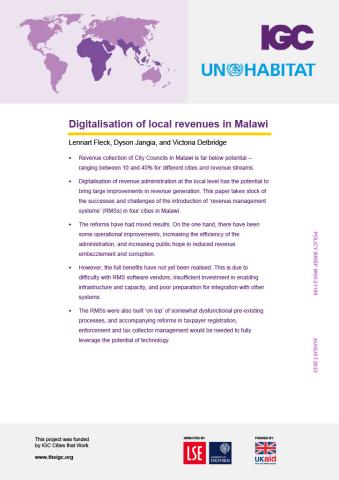Digitalisation of local revenues in Malawi
The objective of the study is to better understand what role the use of digital technologies has or can play in improving local revenue mobilisation from identification to billing and collection across Malawian cities.
-
Fleck et al Policy brief August 2023.pdf
PDF document • 170.77 KB
- Revenue collection of City Councils in Malawi is far below potential – ranging between 10 and 40% for different cities and revenue streams.
- Digitalisation of revenue administration at the local level has the potential to bring large improvements in revenue generation. This paper takes stock of the successes and challenges of the introduction of ‘revenue management systems’ (RMSs) in four cities in Malawi.
- The reforms have had mixed results. On the one hand, there have been some operational improvements, increasing the efficiency of the administration, and increasing public hope in reduced revenue embezzlement and corruption.
- However, the full benefits have not yet been realised. This is due to difficulty with RMS software vendors, insufficient investment in enabling infrastructure and capacity, and poor preparation for integration with other systems.
- The RMSs were also built ‘on top’ of somewhat dysfunctional pre-existing processes, and accompanying reforms in taxpayer registration, enforcement and tax collector management would be needed to fully leverage the potential of technology.




